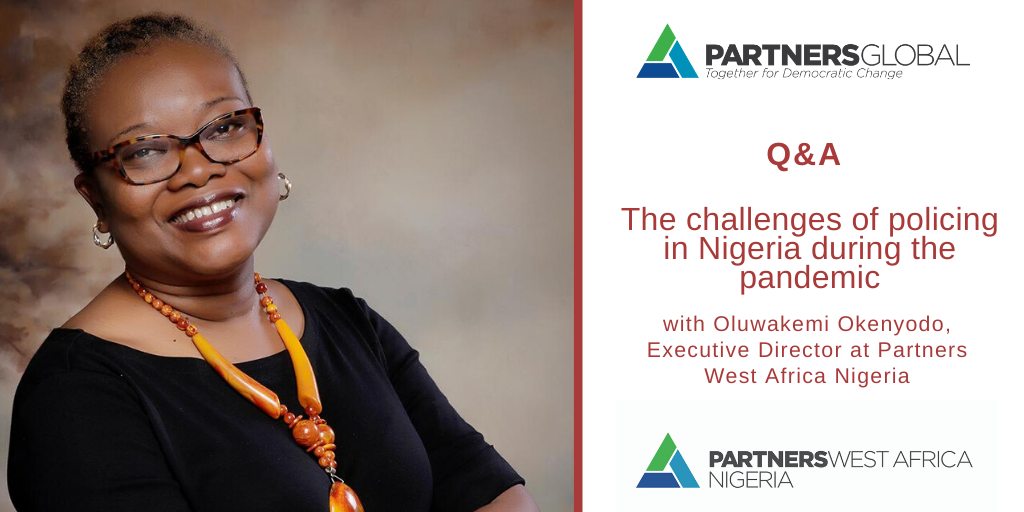Justice in the time of COVID-19: Innovations to preserve rule of law, rights & safety in Nigeria
May 26, 2020
To protect yourself and those around you from COVID-19, public health experts tell us to keep a safe distance from others and to shelter in place at home. But for millions of prisoners around the globe, held in crowded facilities and with little autonomy over their environments, these precautions are all but impossible, leaving them susceptible to infection.

Meanwhile, thousands of others waiting for trial or newly entering the justice system may find themselves increasingly vulnerable to violations of their rights during this time as governments turn to new security measures to enforce public safety, such as rounding up violators of lock down/quarantine orders, and addressing backlogs in court proceedings pile up.
While COVID-19 forces us to reimagine all aspects of our lives and governments to adapt economies, governance, and public services, we should not overlook its impact on the justice system. How is this crisis affecting access to and the administration of justice? How has the state’s provision of security and maintenance of law and order changed?
The U.S, for example, is witnessing an explosion of COVID-19 cases in prisons. As of May 13, the US recorded a total of 25,239 prisoners positive for the coronavirus. Against this sobering reality, states are taking steps to reduce jail and prison populations. Executive orders and other measures have been put in place to release chronically ill and elderly inmates; review cases with low bail amounts; and expedite the release of non-violent offenders and individuals due for release within a 30-day to 4-month period.
U.S. courts are having to innovate and adapt as well to ensure cases proceed swiftly through the criminal justice system. Courts in Texas, for instance, have begun virtual case proceedings. In Seattle, judges have reduced the number of cases that require physical appearances. The U.S. has also seen innovation among its police including the use of drones to enforce social distance guidelines. Some police departments have established online platforms to allow citizens to report non-urgent matters.
Similar innovations are underway in Africa. In Nigeria, where PartnersGlobal implements the Reforming Pretrial Detention in Nigeria project, our project partner the Network for University Legal Aid Institutions (NULAI) is working with the Nigerian Bar Association to provide legal aid to defendants in mobile courts established by the government to prosecute offenders of the Quarantine Act.
Meanwhile, the Government of Nigeria has released elderly, at-risk inmates across the country including from Kuje and Keffi Custodial Centers, where the Reforming Pretrial Detention in Nigeria project provides legal aid to pretrial detainees. For its part, the Ministry of Justice is exploring the possibility of virtual court proceedings and has minimized the number of people allowed in court rooms. To date, no cases of COVID-19 have been recorded within Nigeria Correctional Service.
To find more about these adaptations and innovations, PartnersGlobal’s Director for Sub-Saharan Africa and Accountable Governance Muthoni Kamuyu-Ojuolo interviewed Nigerian colleagues working on the frontlines of some of these changes to ensure that, despite the pandemic, access to justice and rule of law are preserved.
Click below to read the two Q&As.
About the Reforming Pretrial Detention in Nigeria project
Funded by the U.S. Department of State’s Bureau for International Law and Narcotics, the Reforming Pretrial Detention in Nigeria project targets the Federal Capital Territory/Abuja. The project’s goal is to institutionalize a system of detainee registration, representation, and processing that demonstrates rule of law, respect for human rights, and duty of care for victims, the accused, and their families.
To accomplish this, the project will replicate successes from its predecessor the Reforming Pre-Trial Detention in Kuje Prison project by expanding interventions into Keffi Custodial Center and providing technical assistance to a range of criminal justice institutions including courts, prosecuting agencies, the Nigeria Police Force, and the Nigeria Correctional Service.
It is implemented by PartnersGlobal and our consortium including New-Rule, Partners West Africa Nigeria (PWAN), and the Network of University Legal Aid Institutions in Nigeria (NULAI).
The project will improve the functioning of the information management system utilized by the Nigeria Correctional Service, introduce technology into court proceedings, provide institutional support to improve interagency coordination and address inefficiencies in case management, and works to improve remand warrant procedure. It also provides legal aid at select police stations, strengthens clinical legal education through training and exchange visits, and pairs law students with pro bono lawyers to provide legal representation at Keffi and Kuje Custodial Centers.


